This is my friend, Lariza.

(She's on the right).
Now Lariza is a smart girl who is currently majoring in anthropology at UCLA. She also happens to speak three languages: English, Tagalog, and Italian.
And she speaks Italian because, well, she's Italian herself.
She's both a Filipina and Italian, and she was born and raised in Milan, and used to live there, up until a few years ago. That's when her parents decided to move her and her family to California. She now lives in the US and goes to school here, but she still fondly thinks of Italy as home.
In addition to this, there's also another, current, Milan resident to consider.
His name is Mario Balotelli.
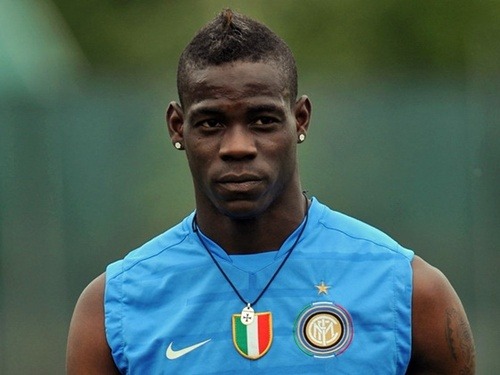
Mario was born to Ghanaian parents in Sicily before being adopted by the Balotellis, a Jewish-Italian couple, at the age of two. As I've written elsewhere, Mario is a lightning rod due to the criticism he attracts to himself. However, part of the reason why Mario acts out is because of the racial abuse he gets. With this in mind, it's understandable how he'd be a bit temperamental at times. This aside, his talent is absolutely immense, and it simply cannot be denied (despite his somewhat erratic behavior).
And he's not the only Italian person of color making a name for himself. There's also Stephan El Shaarawy, who's half-Egyptian and half-Italian (and who also plays for Milan).
Angelo Ogbonna is the son of Nigerian parents and was born on Italian soil. He currently plays for the peninsula's most popular team, Juventus. Hachim Mastour plays for Milan's Primavera (Youth) squad, and he's the child of Moroccan immigrants who settled into Italy. Finally, there's Fabio Liverani, who has the rare distinction of being both the first Black Italian to have represented Italy at the national level, and to have coached in Serie A.
All five of these athletes have represented Italy on different levels on the international stage, and Mario is sure to lead the line for the Azzurri at the upcoming world cup.
On the non-sporting side of things, there's Denny Méndez, a Dominican born woman who later became an Italian citizen. She was crowned Miss Italy in 1996.
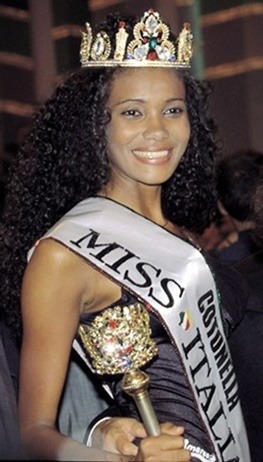
Claudia Cedro is a half-Haitian and half-Italian model.
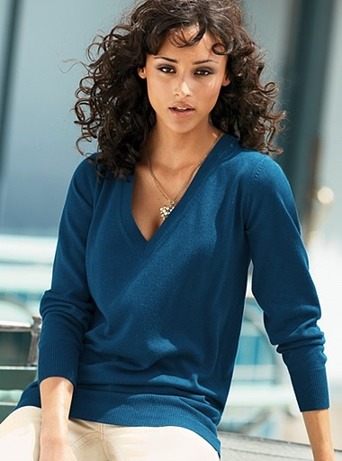
And finally, there's Cécile Kyenge, the Italo-Congolese Minister of Integration.
What's the point of bringing all of this up? The point is to demonstrate that Italy's demographics are currently changing. As more and more immigrants call Italy their home, the country will adapt accordingly to these changes. Those changes will subsequently be reflected in all spheres of Italian life, where we will see people of color be more visible throughout the peninsula.
Moreover, even MTV has taken notice of the how immigration is sculpting the Italian landscape, by airing a recent documentary series entitled Siamo Cinesi, Siamo Italiani (We Are Chinese, We Are Italians), which documents the struggles of young Chinese-Italians as they struggle to maintain their own cultural identity, while fitting into the wider context of Italian culture, as a whole.
All of the individuals mentioned here dispel the disassociate notion that just because you're black, or any other color, that you somehow can't also be Italian, as many people assume Helena no longer is. It is very much a fallacious notion and as I've demonstrated above, you very much can be both.
Italy is not just a place full of swarthy people with 'white' features that we think it is. Rather, the country happens to be a rather diverse place. In fact, people of color have had a long history in the peninsula, which includes miscegenation in Ancient Rome, to members of the Medici family; to being characters in famous plays, and they can even claim one of the former Popes as their own.
When you put it all together, it makes a plausible case for Helena to be a woman of color, and to still be 100% Italian. She could also at the very least, be biracial, and I say that due to the fact that her father, 'Frank', still very much appeared to be white when we last saw him in an issue of the Justice League. We still don't know much about Helena's mother and her background.
There's also the very real possibility that she could not in fact, be biracial, or a different race, and she could just be well, Sicilian. Sicilians tend to be pretty diverse, in terms of their genetics. Furthermore, it's also worth noting that the African influence in Sicily is so great, that it simply cannot be downplayed and dismissed. With this in mind, it's also worth stating that curly hair and swarthy skin tones aren't exactly uncommon amongst Sicilians, especially given how long the island was ruled by The Moors and other invaders, along with the fact that the province has a close proximity to North Africa.*
*(It should be noted that many Sicilians consider themselves distinct from other Italians, due to the discrimination against them, which also includes threats of secession. However, going into the intricacies of why this is the case, would only prolong this post, and the discussion is much too complex to condense into a succinct point. So for the sake of space, I'll focus more on the perception of Helena as a representative of Italians, since Sicily is technically a part of the country, but I’ll do so while being aware of how Sicilians have been discriminated against, and how some choose to identify themselves.)
Moreover, it's also worth pointing out even if Helena's skin has gotten darker, and her hair curlier, it doesn't necessarily mean that she's being "racebent". For one thing, one has to keep in mind that the concept of race is not in fact, static in nature. The concept of race is malleable, as it is a social construct that's based on local mores, amongst a variety of factors. And how people choose to define themselves varies by country and culture, and is subject to interpersonal interpretation.
As one woman of Sicilian descent pointed out to me, these complexities have led many Sicilians to avoid identifying themselves as white, while at the same time, not identifying as black as well.
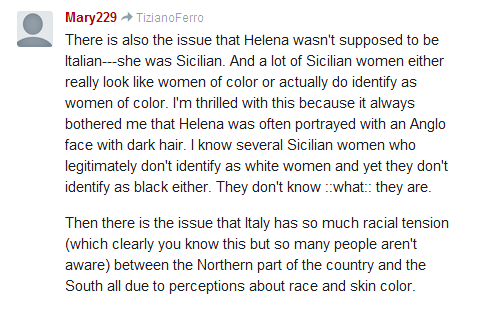
So in other words, throwing up the charge that they're 'racebending' Helena may not only premature in this instance, but it is also a display of ignorance on the part of the speaker as they fail to understand how racial and ethnic identities are formulated outside of the Americentric sphere.
The charge not only fails to take into account the intricacies of identity, and how it's formed, but it also doesn't consider the complicacy of Sicilian history, and how the past governs the way Sicilians currently view themselves. The 'racebending' accusation even manages to overlook evolution, particularly with how individuals close to the equator developed more melanin, in order to protect themselves against the uv rays from the sun.
In particular, people from the Mediterranean Basin developed olive skin and swarthy appearances, in order to adapt and thrive in their sun drenched environments. And after you put all of this together, it won't be that hard to see how giving Helena curly hair and making her skin tone a dark olive hue, was a pretty logical thing to do.
But of course, none of these things called 'facts' will stop people from overlooking them, in order to have a fit and to continually accuse DC of 'racebending', despite not knowing the entire context behind these changes.
(And by the way, the concept of using "racebending" as a pejorative is pretty worthy of a side-eye in itself. But that's a whole 'nother conversation for later.)
However, it says a lot that so many people are getting up in arms at the prospect of Helena quite possibly becoming black. To invoke a comparison, take a look at the outrage over Lucy Liu becoming Joan H. Watson in Elementary. It says a lot that people can accept John Watson as a mouse, a robot, and a tomato, but the moment John becomes Joan and is changed into an Asian-American woman, nearly everyone hits the roof, and loses it. We see a similar type of scenario here, where people are more outraged at the changes to Helena based on cursory glances at her phenotypes, more than the fact that she's working for an organization like Spyral (which I would think would be a far, worse fate to be consigned to, than being a black woman).
We also see something similar with the film Maleficent, where people are willing to accept the phantasmagorical notions of fairies, shape shifters and monsters without question, but choose instead, to nitpick on the fact a black man was cast in the film. The fact that they chose to zero in on that says a lot about their priorities as an individual.
The outrage over the possible changes to Helena's race is sadly, one in a long line of incidents that demonstrate that many comic book fans have internalized notions of race that need to be worked on. For some strange reason, many comic book fans can accept the absolutely, fantastic notions and reality bending that come with superhero comics, but the one area where they draw the line and demand realism, is in terms of race.
It's also quite frankly insulting to read so many people claim that Helena is being treated so "shittily" and that this somehow falls into a pattern of mistreatment that she has experienced over her long career. While there is no doubt that Helena has been treated quite horribly (e.g. slut-shamed, kidnapped and raped, etc.) I would hardly think that this qualifies as mistreatment. By saying that Helena is 'being ruined' or saying she's 'getting the short end of the stick' here, you're also implying by default, that you think it's pretty shitty to be a woman of color. To which the woc will reply, "Yeah, we know that already."
And it's because people like you complain vociferously about our mere presence.
Speaking of which, on a personal level, as a woman of color (Asian-American, to be exact) I am all for this. I, like so many other minorities, are underrepresented in the media, so anytime a character who happens to be a person of color is introduced, I feel it should be celebrated more than reviled. Even if Nu!Helena does not share my ethnic background, it should still be commended.
It should be commended for the fact that introducing a new character who happens to be a minority, or reintroducing one as a minority, does redress one of the wrongs that have been inflicted upon these groups, which in this instance, happens to be minimal representation.
More minorities having a visible presence in a medium is a good thing, as studies have shown that young people are affected by representation in the media, and not seeing someone who looks like them, can be detrimental to their self-esteem. Bearing this in mind, all of this makes a compelling case to make a character a woman of color.
Changing Helena in this way also presents us with the unique opportunity to not only see an American minority get more visibility, but a European one as well. Prior to the reboot, Helena Bertinelli had a dual citizenship as both a citizen of the United States, and Italy, due to having been born in the US, before being relocated to Sicily after her family's death, and spending half of her life there.
If Seeley and Co. choose to keep that aspect of her in tact, then magnifying Helena in this way gives us a chance to see another group we don't get much exposure to in the American media, and that's Europeans who happen to be minorities, and more specifically, people of color.
Given the previously mentioned racial abuse of Mario Balotelli, along with the emergence of the far right in the recent European elections (the both of which are but a microcosm of the issues related to race and immigration in Europe), the changes to Helena could possibly give us a springboard to discuss these issues, and they could also provide us with a lens through which we can examine these contemporary topics.
Most of the people who are outraged over the changes to Helena act like someone is being taken away from them. In fact, that's not the case at all. The Helena you love could still very well be alive in this incarnation, albeit with a swarthier skin tone, curlier hair, and a slightly altered backstory.
Just because her phenotypic characteristics have changed, doesn't necessarily mean that she has. At least not entirely.
There's simply not much proof that changing the way she looks will somehow invalidate her entire canon, and making her a woc will also invalidate her established legacy, and that she won't be able to live up to it. In fact, there's a possibility that she can build upon what she already has, in order to create something that will become even greater than what she's already established.
Besides, it's not like Helena hasn't endured a few changes during her 25 year history. Anyone remember Cry for Blood?
So, if Helena's fans were able to handle those retcons, I'm sure they'll be able to handle this one. Though this does bring up the legitimate point that the current changes to Helena might confuse prospective fans, due to how she's portrayed as a different race in one medium (e.g. televison, etc.) and will be a different one in the comics.
However, I don't see how changing her in this way will be much of a hindrance for people who want to get to know Helena. After all, Nick Fury has been a white man since his inception in 1963. That changed when Mark Millar decided to make him an African-American in the Ultimates universe. That version of Nick Fury ended up in the highly rated Avengers films, and it's the one the public at large is familiar with.
As a result, Marvel created Marcus Johnson and made him Nick Fury Jr., as a way of generating symmetry between the 616 universe, and the MCU. While some might question the wisdom of this, particularly in regards to the fate of Nick Fury Sr., the one thing that can't be denied is that it's proof that sometimes, changing the race of a character can in fact, be successfully implemented.
Conveniently, this also leads me to another segueway, and that's addressing the argument of "Why don't they just create a new character?" The thing is, new characters who happened to be people of color were created, and the comic book public still managed to complain about them. I have a sinking feeling that even if Tim Seeley had created a brand new, character who happened to not be named Helena Bertinelli and who happened to be black, a lot of people would still be complaining simply because it wasn't 'their' Helena who was coming back as The Huntress.
So it's a case of damned if you do, damned if you don't. If you create a legacy who happens to be person of color, people will still complain and say that you're being 'politically correct'. If you keep all aspects of the character in tact, and change only the color of their skin, people would still say the exact same thing. And they'll do so without realizing that the fact is, it’s better to attach a new character who happens to be a person of color, to a legacy and a line as they have a better chance of surviving through that name association, then they would as a stand alone in the marketplace.
There are exceptions to the rule, of course. But overall, the evidence seems to support the case that it's better to attach these new characters to an already established legacy, in order to better ensure their survival. And sometimes, doing so can yield some pretty positive results. Ryan Choi’s pre-reboot run on The Atom (before he was killed off) can attest to this, as well as the subsequent success of John Stewart, Miles Morales and Kamala Khan.
In addition to these gripes, some of the arguments against changing Helena hinge on the notion that the mafia and mafiosi in general, tend to be pretty racist. While this is in fact, quite true, one must also keep in mind that DC's mafiosi operate in a universe where people fly around in tights and lift tall buildings over their heads. They also move giant planets with their rings.
They also cavort around with space gods and have affairs with alien princesses from other worlds. Or to put it plainly: in the same way the laws of physics can kiss my (superheroic)ass, the laws of realism are often bent in the world of comics. Furthermore, as Hellionkitty has pointed out to myself and others, DC's portrayal of the mafia hasn't exactly been accurate.
That's largely in part to how writers have ignored the racialized dynamic between Northern and Southern Italians, in order to lump them together into one, monolithic mass that adheres to a literary truth, but not so much to any truth that's based in real life. (E.g.: Having Carmen Falcone call himself 'The Roman'. That seems like a little far-fetched thing for a Sicilian to do, given that part of the reason why the mafia was created, was in response to the discrimination by Northern Italians.)
And even if the real life members of the Italian mafia did harbor notions of racial prejudice, that didn't stop them from putting it to the wayside in order to make a profit. During segregation for example, local mafiosi would often flout segregation laws in order to hire black jazz musicians, and have them play alongside their Italian counterparts. They even paid them at better rates than most other, 'legitimate' business owners did.
The mafia's racial integration of America not only happened at jazz clubs, but gay bars as well, including the famous Stonewall, which was at the time, the most racially diverse bar in New York City.
Furthermore, non-Italians have also been accepted into a few mafia syndicates, and have even played critical roles in the complex matrix of the mafia's criminal organization. So maybe the organized crime institution isn't as adherent to Old World values as some would think. Like any good business, they tend to adapt themselves and be flexible towards the current environment, in order to maximize their profits.
With this in mind, it's plausible to come up with a scenario where the mafia in Gotham is so afraid of 'Frank' that they'll put aside their own, racial hang-ups, in order to embrace his curly haired daughter. And in a universe where people can fall in love with space aliens, and New Gods, then is it so much of a stretch to assume an earthly man can fall in love with an earthly woman? After all, I would think time and space and alien DNA would be just as much of an obstacle to love than race can be.
So to bring it all back home, when it comes to changing the way Helena Bertinelli looks, I am all for this. I am especially all for it, considering that it would be one way to once and for all, distinguish Helena Bertinelli from Helena Wayne, and for people to stop claiming that they're the "same" person. Well, they can no longer do that, because the two of them no longer look a like.
While I can accept all this, what I won't like however, are drastic changes to Helena's personality. I still want the same Helena who was stubborn and headstrong. I want the same Helena who would throw you off the roof one minute, while embracing children tenderly with another. I want the same Helena who didn't care what people thought about her, and who was anti-ableism, and who wasn't afraid to do the right thing, no matter how steep the personal cost might have been. As long as keep that crux of her personality in-tact, then I could handle all the other changes.
The potential change in Helena's personality is one of the few things I'm concerned with, along with how the execution of all Tim Seeley has proposed will play out. There is a possibility that this change could be badly handled, just like Wally West's introduction into the Nu52 has been. However, until I see concrete evidence that this is in fact, the case with Helena, then I will reserve judgement until I see the final product.
There's also a lot more points I could make here, and they range from black children being adopted by Italian couples, to how the Italian mafia has worked in collaboration with organized crime syndicates in Nigeria; to my friend David's legitimate points about how the writers of DC have portrayed Italians in the past and if Tim Seeley is not careful, he could end up perpetuating those stereotypes; to how Strom Thurmond's black daughter shows how complex the concept of racism in America is; to how Jennifer Teege is an example of how love can evolve and move past even the most virulent strains of racism.
Then there's also the fact that DC doesn't always treat its minority characters well, and sometimes, even being a legacy doesn't prevent you from being killed off or being poorly written.
The fact of which, does fill me with a little concern. However, none of this nulls and voids any of the legitimate points being made here. Nor does it mean that my support for the upcoming storyline in Grayson should be dampened (at least for the time being).
And there several other things I could address as well. However, since that would make this post a lot longer than it is, I'm content to just leave it here.
At around the same time that Mario Balotelli will be leading the Azzurri at the World Cup, and on the same day that Maya Angelou dies, this bombshell about Helena Bertinelli was dropped upon us. Changing Helena like this indeed, a powerful statement to make. The effects of this may seem like a ripple in a small pond, due to how she's only known among the limited comic book audience (and to Arrow fans) but sometimes, those ripples can have large reverberations. And provided this is executed properly, they can be extremely positive ones as well.
Finally, I'll leave you with these remarks by Tumblr user therearecertainshadesoflimelight, an actual Sicilian-American woman, as to why the changes incorporated into Helena should be supported, and why they matter.
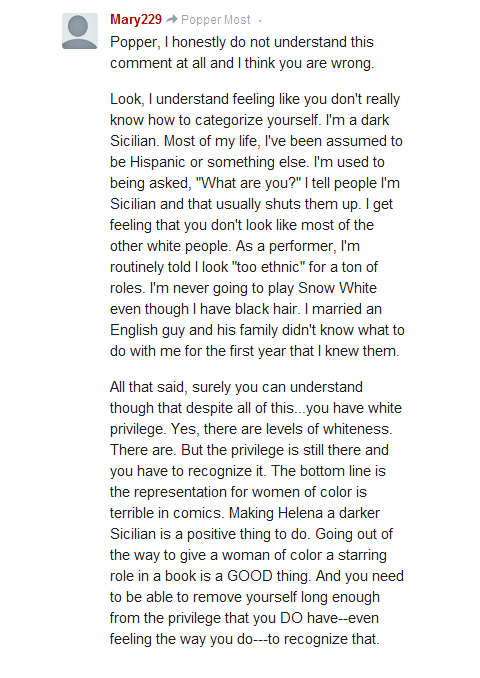
To paraphrase Raymond Zhou when he defended Lou Jing (another mixed-race girl who was the subject of controversy), this Helena has my vote.
No comments:
Post a Comment